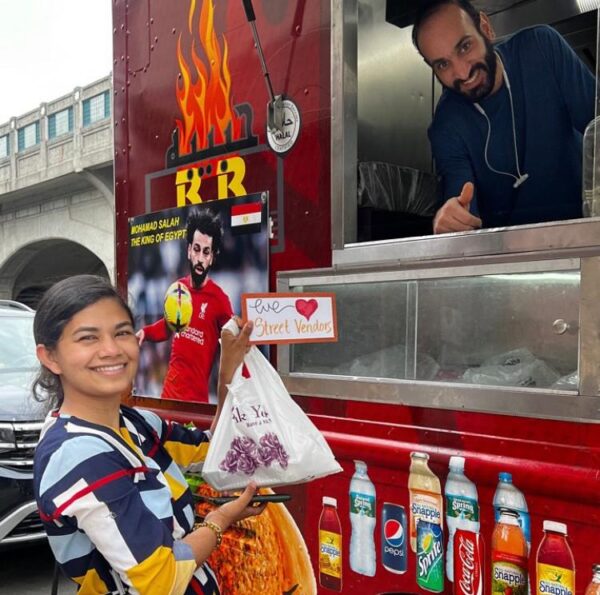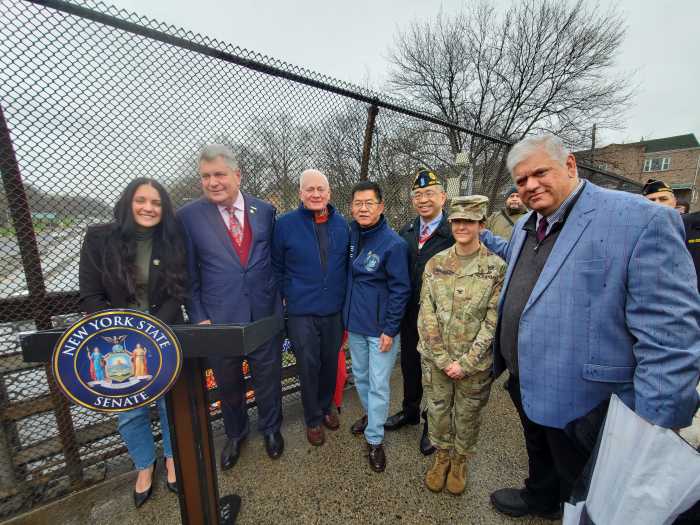
To call Charlie Linville fearless is an understatement.
As a staff sergeant with the U.S. Marine Corps, Linville disarmed explosives in Iraq and Afghanistan.
Even after losing his right foot to severe injuries from an explosion, Linville went on to become the first combat-wounded veteran to reach the top of Mount Everest.
But navigating city streets and even lines at the grocery store could be a daunting task for the 33-year-old veteran until he was paired up with Devon, a specially-trained dog from Canine Companions for Independence about five years ago.
“In the initial stages of my recovery, he was this ice breaker,” said Linville, who was injured in 2011 and now works as a general manager for an Equinox gym in Manhattan. “I didn’t want to talk about me all the time. Now you have this adorable creature by your side and people want to talk about Devon.”
While Devon was trained to help Linville pick up dropped items and open doors, the emotional support the loving pooch provides was immeasurable, he said.
“If I am having a bad day, he just instinctively knows,” Linville said. “He’ll come and put his head in my lap and hang out.”
For the first time, Canine Companions is specially training dogs to work with veterans who have post-traumatic stress disorder.
In its northeast headquarters in Medford, Long Island, dogs are learning skills such as turning on lights and gently interrupting a nightmare by pulling away the bedsheets.

The organization provides dogs free of charge for children and adults with disabilities. Since 2008, the group has paired up over 300 veterans with dogs to help them primarily with physical tasks.
After participating in a study with the U.S. Department of Veterans Affairs about the use of assistance dogs, the group started a pilot project in California, graduating four veterans and their dogs last fall.
Post-traumatic stress disorder is a mental health condition that some people develop after experiencing or witnessing a life-threatening event, such as combat, according to the VA. June has been designated as PTSD Awareness Month with mental health and military officials urging people to get screening and treatment.
According to the agency, between 11 and 20 percent of veterans who served in operations Iraqi Freedom and Enduring Freedom and about 12 out of every 100 Gulf War veterans have experienced PTSD in a given year. About 30 percent of Vietnam veterans have experienced PTSD at some point in their lives.
While Devon did not receive specific training for PTSD, Linville said he believes veterans will benefit from having dogs with those skills.
“Veterans really need to feel like they are part of the community,” Linville said. “They can lose touch with their friends and family … these dogs are amazing and life-changing.”
Canine Companions is urging veterans with service-related PTSD in the New York metropolitan area to apply for the program, which expects to start its first class in December, with more to follow.
“We saw right away the benefits to veterans by the commands the dogs were performing to mitigate their PTSD,” said Jeanine Konopelski, director of marketing for Canine Companions.

Veterans with PTSD can have trouble with social actions such as going out to dinner, buying groceries or attending a movie because of the noises and the crowds, said Jessica Reiss, northeast participant program manager for Canine Companions.
“The dogs can really help those individuals who just need that extra step to be part of the community again,” she said.
Reiss said candidates should be in a treatment program, have a solid support system and be able to manage and pay for their dog’s ongoing care.
Bruce Pitman, a U.S. Marine Corps veteran who was deployed to multiple combat zones, struggled with PTSD and mobility issues that left him feeling isolated. He was paired with Wembley, a yellow lab, as part of Canine Companions’ pilot program in California last year.
“I would never in my wildest dreams speak to someone on the street, that’s how closed off I was,” said Pitman, 55. “But Wembley enables me to talk to people.”
He said Wembley also knows how to diffuse his anxiety, which often surfaces as anger.
“He sees me rubbing my hands together, which he knows is a sign,” Pitman said. “He gets right up against me, knocks my hands apart and puts his chin on my knee. He really tamped it down so much, I can function like a person again.”































